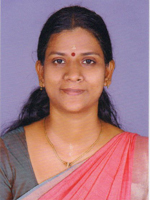Sanskrit has played a vital role in the development of all Indian languages and in the preservation of the cultural heritage
of India. No Indian Language can flourish without the help of Sanskrit. It also provides the theoretical foundation of
ancient sciences. Hence it becomes essential to preserve and propagate Sanskrit for the all round development of students
in India. Fully conscious of this responsibility college started Sanskrit department in 1965 by having opted Sanskrit as
a complementary subject for UG Malayalam and UG common course. Also complementary course for PG Malayalam was
started from 2009 onwards.
Vision :
To be a center of excellence for learning Sanskrit, to propagate Sanskrit literature and Indian cultural values, to preserve the Sastra tradition, to popularize the great epics of our motherland, to promote traditional knowledge and to show their relevance to the contemporary society.
Mission :
Sanskrit Department will actively and constantly promote and preserve the higher values and ethics in education and
will pursue excellence in all areas to enrich our character, tradition, culture, nation and humanity at large.
Our Motto :
The motto of the department is chosen from Samhithopanishad \\\\\\\"विद्ययाऽमृतमश्नुते” vidyayā amṛtam aśnute (Saṃhitopaniṣad)(Eat nectar through knowledge, i.e. be immortal through knowledge) explicitly focuses on the central purpose of education and also speaks of the vision and the idealism for which Sanskrit language is learned and taught.
Courses offered :
• Common Course (second language) for UG Students
• Complementary Course for UG Malayalam and PG Malayalam
Best practices/teaching learning methods :
• Detailed notes of sections discussed in the class.
• More attention is given to answering problems of each section.
• Frequent class tests, monthly and term tests & model exams are conducted.
• Encourage the students to raise doubts in the class rooms.
• Inter department competition.
• Subject oriented seminars.
• Project works.
• Group discussions in the class rooms on contemporary issues
• Debates on relevant topics & Sanskrit poetics.
• Students are encouraged to attend seminars & present papers .
• Special classes on Saturdays and other free periods so that topics are discussed extensively.
• Active research and publishing papers.
• Seminars, Group discussions, Debate etc.
• The students feed-back is collected every year and the corrective measures are adopted wherever necessary.
| HOD |

Dr MANJU P. M.
pm.manju111@gmail.com
Mphil , PhD & JRF
|

